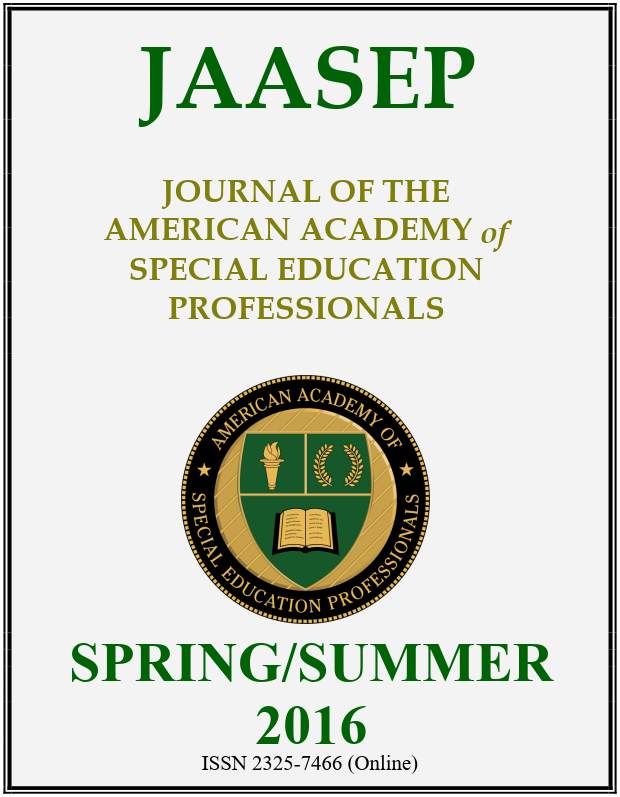Follow-Up Study to Family Members’ Reactions to the Initial Special Education Meeting
Applequist, K. L. (2009). Parent perspectives of special education: Framing experiences for prospective special educators. Rural Special Education Quarterly, 28 (2), 3-16. DOI: https://doi.org/10.1177/875687050902800202
Bateman, B. & Linden, M. (1998). Better IEPs: How to develop legally correct and educationally useful programs. Longmont, CO: Sopris West.
Bezdek, J., Summers, J. A., & Turnbull, A. (2010). Professionals’ attitudes on partnering with families of children and youth with disabilities. Education and Training in Autism and Developmental Disabilities, 45(3), 356 – 365.
Boyle, J. R. & Provost, M. C. (2012). Strategies for teaching students with disabilities in inclusive classrooms: A case method approach. Boston: Pearson.
Dabkowski, D. M. (2004). Encouraging active parent participation in IEP team meetings. Teaching Exceptional Children, 36(3), 34-39. DOI: https://doi.org/10.1177/004005990403600304
Deslandes, R., Royer, E., Potvin, P., & Leclerc, D. (1999). Patterns of home and school partnership for general and special education students at the secondary level. Exceptional Children, 65(4), 496-506. DOI: https://doi.org/10.1177/001440299906500405
Deslandes, R. & Bertrand, R. (2004). Motivation of parents to participate in the schooling of their children in primary. Journal of Education, 30(2), 411-433. DOI: https://doi.org/10.7202/012675ar
Deslandes, R. & Bertrand, R. (2005). Motivation of parent involvement in secondary-level schooling. Journal of Educational Research, 98(3), 164-175. DOI: https://doi.org/10.3200/JOER.98.3.164-175
Drasgow, E., Yell, M. L., & Robinson, T. R. (2001). Developing legally correct and educationally appropriate IEPs. Remedial and Special Education, 22(6), 359-373. DOI: https://doi.org/10.1177/074193250102200606
Fish, W. W. (2006). Perceptions of parents of students with autism towards the IEP meeting: A case study of one family support group chapter. Education, 127(1), 56-68.
Flynn, G. V. (2006). The middle school connection: Fostering alliances with parents. Science Scope, 29(8), 12-15.
Fox, L., Vaughn. B., Wyatte, M.L., & Dunlap, G. (2002). We can't expect other people to understand: Family perspectives on problem behavior. Exceptional Children, 68(4), 437-450. DOI: https://doi.org/10.1177/001440290206800402
Friend, M. (2005). Special education: Contemporary Perspectives from school professionals. Boston: Pearson.
Gay, L. R., Mills, G. E. & Airasian, P. (2006). Educational research: Competencies for analysis and applications (8th ed.). Upper Saddle River, NJ: Pearson.
Hammond, H., Ingalls, L. & Trussell, R. P. (2008). Family members’ involvement in the initial Individual education program (IEP) meeting and the IEP process: Perceptions and reactions. International Journal about Parents in Education, 2(1), 35-48. DOI: https://doi.org/10.54195/ijpe.18154
Hardy, P.G. (1979). Education decision-making in special education: Parent involvement. Dissertation Abstracts International, 40(4-A), 2000.
Heward, W. L. (2009). Exceptional children: An introduction to special education (9th ed.). Upper Saddle River, NJ: Merrill.
Kayama, Misa. (2010). Parental experiences of children’s disabilities and special education 62 In the United States and Japan: Implications for school social work. Social Work, (55)2, 117 – 125. DOI: https://doi.org/10.1093/sw/55.2.117
Lo, L. (2012a). Demystifying the IEP process for diverse parents of children with disabilities. Teaching Exceptional Children, 44(3), 14 – 20. DOI: https://doi.org/10.1177/004005991204400302
Lo, L. (2012b). Preparing Chinese immigrant parents of children with disabilities to be school partners. In A. Honigsfeld & A. Cohan (Eds.), Breaking the mold of education for culturally and linguistically diverse students. Lanham, MD: R & L Education.
Lo, L. (2014). Readability of individualized education programs. Preventing School Failure, 58(2), 96 – 102.
McAleer, M.I. (1978). The parent, teacher, and child as conference partners. Teaching Exceptional Children, 10(4), 103-105. DOI: https://doi.org/10.1177/004005997801000402
Martin, J. E., Marshall, L. H. & Sale, P. (2004). A 3-year study of middle, junior high, and high school IEP meetings. Exceptional Children, 70(3), 285-297. DOI: https://doi.org/10.1177/001440290407000302
Mueller T.G., Milian M., & Lopez M. I. (2009). Latina mothers’ views of a parent-to-parent support group in the special education system. Research & Practice for Persons with Severe Disabilities, 34(3 – 4), 113 – 122. DOI: https://doi.org/10.2511/rpsd.34.3-4.113
Mueller, T. G. & Buckley, P. C. (2014). The old man out: How fathers navigate the special education system. Remedial and Special Education, 35(1) 40 – 49. DOI: https://doi.org/10.1177/0741932513513176
Rock, M. L. (2000). Parents as equal partners: Balancing the scales in IEP development. TeachingExceptional Children, 32(6), 30-37. DOI: https://doi.org/10.1177/004005990003200604
Singh, D. K. (2003). Let us hear the parents. Journal of Instructional Psychology, 30(2), 169-172.
Smith, D. (2001). Introduction to special education: Teaching in an age of opportunity. Needham Heights, MA: Allyn and Bacon.
Smith, T., Gartin, B.G., Murdick, N., & Hilton, A. (2006). Families and children with special needs. Upper Saddle River, NJ: Pearson.
Soodak, L.C. & Erwin, E.J. (2000). Valued member or tolerated participant: Parents’ experiences in inclusive early childhood settings. Journal of the Association for Persons with Severe Handicaps, 25(1), 29-41. DOI: https://doi.org/10.2511/rpsd.25.1.29
Turnbull, A., Turnbull, R., Erwin, E., & Soodak, L. (2006). Families, professionals, and exceptionality (5th ed.). Upper Saddle River, NJ: Pearson.
Turnbull, A., Zuna, N., Hong, J.Y., Hu, X., Kyzar, K., Obremski, S., Summers, J.A. & Stowe, M. (2010). Knowledge-to-action guides for preparing families to be partners in making educational decisions. Teaching Exceptional Children, 42(3), 42-53. DOI: https://doi.org/10.1177/004005991004200305
U.S. Department of Education (2001). Twenty-third annual report to Congress on the implementation of IDEA. Washington, DC: Author.
Vaughn, S. R., Bos, C. S., and Schumm, J. S. (2013). Teaching students who are exceptional, diverse, and at risk in the general education classroom (6th ed.). Boston: Pearson. Wright, K., Stegelin, D.A., & Hartle, L. (2007). Building family, school, and community partnerships (3rd ed.). Upper Saddle River, NJ: Pearson.
Yell, M. L., & Drasgow, E. (2000). Litigating a free appropriate public education: The Lovaas hearings and cases. The Journal of Special Education, 33, 205-214. DOI: https://doi.org/10.1177/002246690003300403
Downloads
Article Information
- Article Type Articles
- Submitted May 2, 2016
- Published June 15, 2016
- Issue Spring/Summer 2016
- Section Articles
